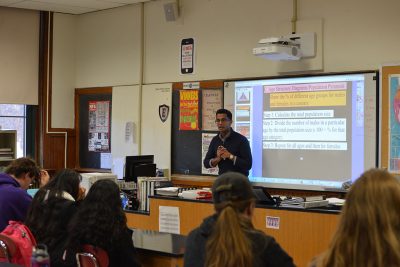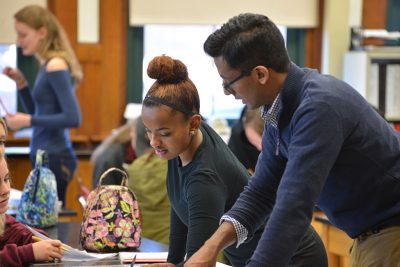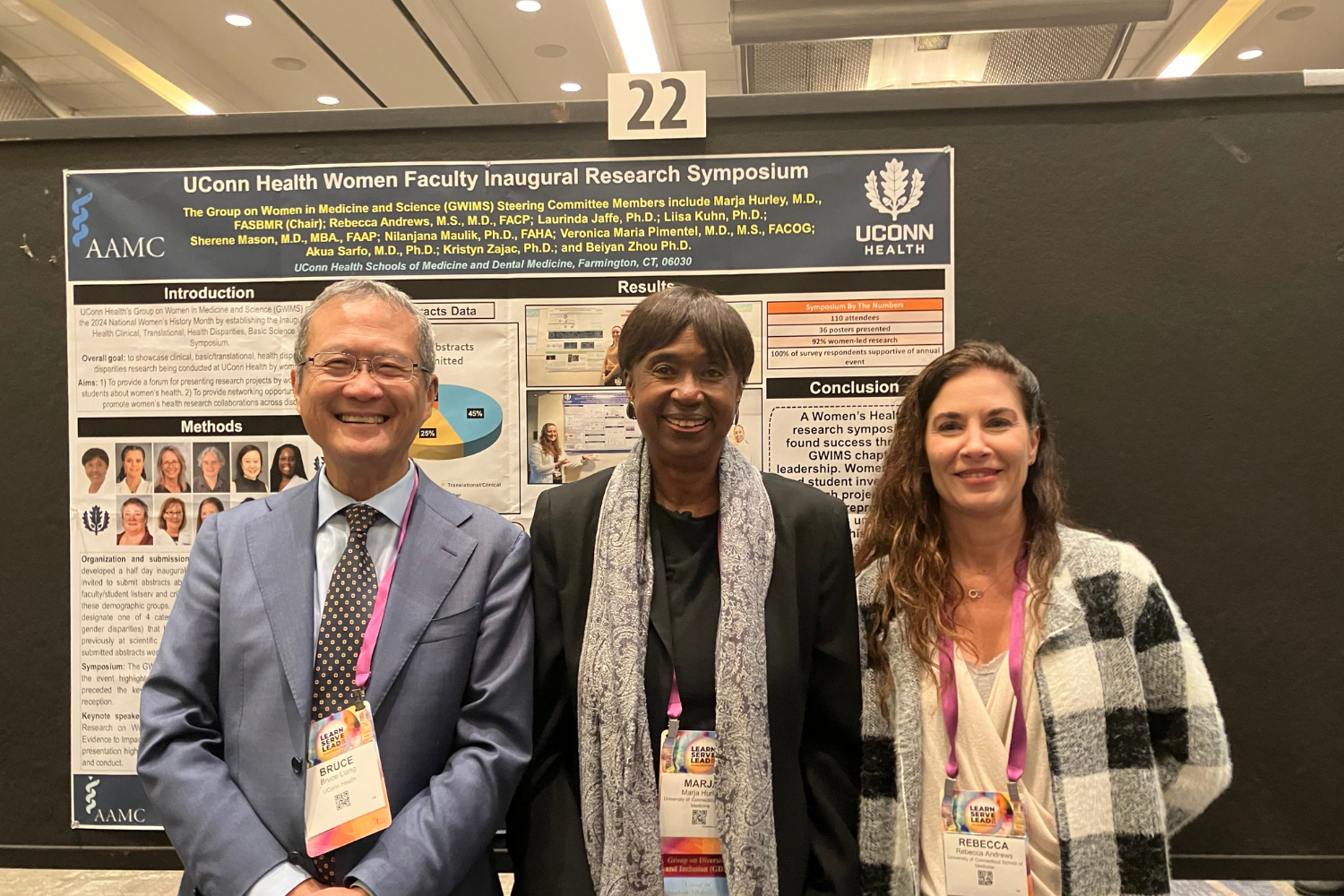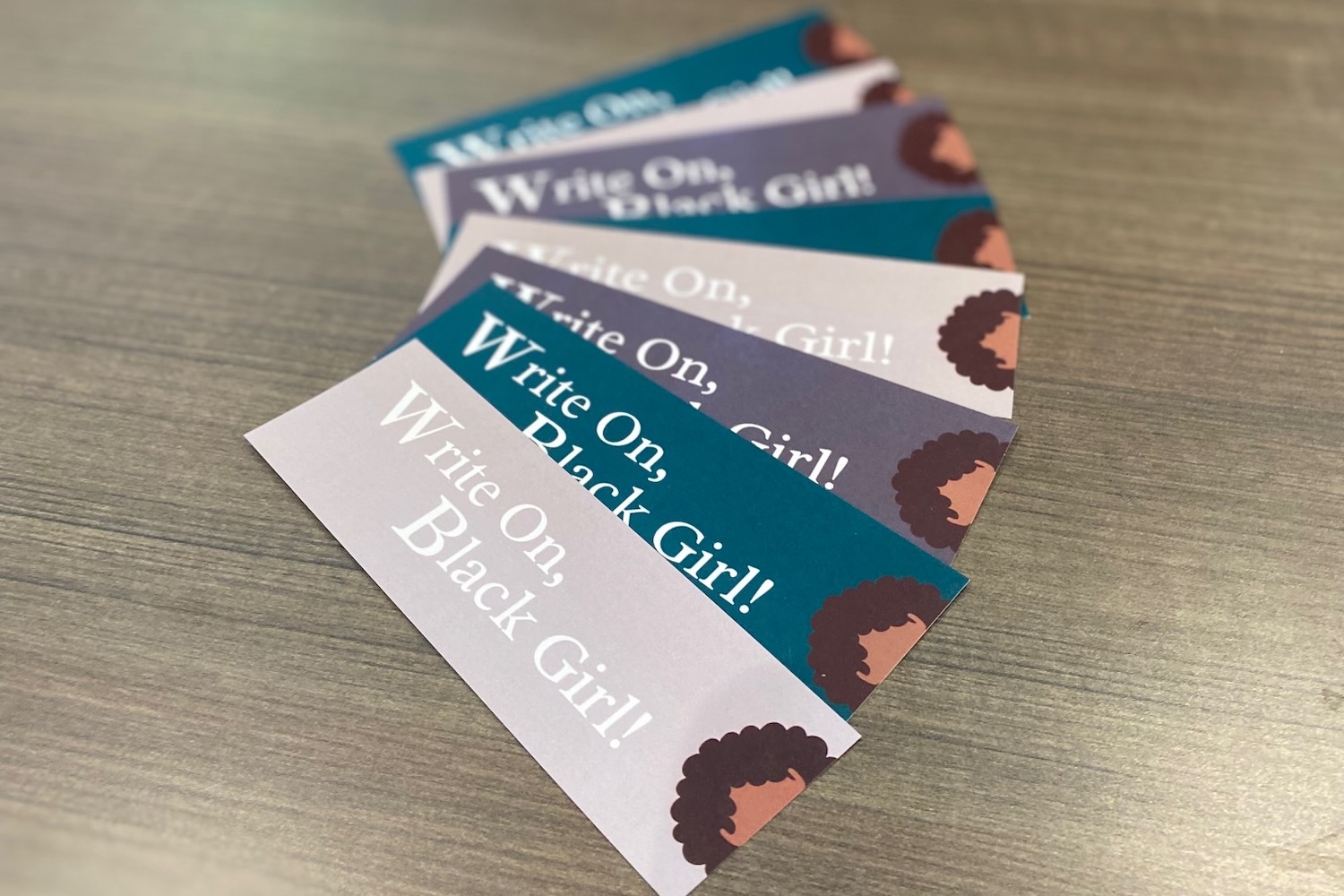Career paths are not always obvious or direct. Sometimes it takes some encouragement from a family member or a supportive teacher, and maybe a pinch of self-belief for an individual to choose a path. Sometimes it takes an accumulation of outside support, a nudge in the right direction. Sometimes career paths take unexpected turns.
For current Neag School of Education student Sushruta Kunnenkeri, 31, who is enrolled in the Teacher Certification Program for College Graduates (TCPCG) based at UConn’s Avery Point campus in Groton, Conn., it took allowing a seed his father planted to blossom.
For Kunnenkeri, education and science have always been part of his life, which even reflects his first name, Sushruta, the ancient Sanskrit name of a celebrated fifth-century physician in India known as “the father of surgery.”
“My father gave me and my siblings all ancient Sanskrit names. He named me Sushruta, planting the seed of understanding science at an early age,” says Kunnenkeri. “I’m proud of my name now, but my dad would always bring it up during doctor’s appointments.”
Building Confidence
When Kunnenkeri was a child, his father fostered a learning environment at the kitchen table, inviting his children to talk about science and history, giving them the confidence to explore new fields and ask questions — something Kunnenkeri, now an aspiring science teacher, wants to encourage his students to do.
“If I can help build students’ confidence and coach them in the right direction, building their level of understanding … about science, it might change their lives,” says Kunnenkeri, whose professional experience prior to joining TCPCG includes having served as a mental health counselor at such institutions as Tufts Medical Center, where he co-taught and led clinical education classes for patients. Prior to working at Tufts, Kunnenkeri worked as a clinical research assistant at the Immune Disease Institute at Harvard Medical School in the Alper lab, where he co-authored a research paper.
“If I can help build students’ confidence and coach them in the right direction, building their level of understanding … about science, it might change their lives.”
— Sushruta Kunnenkeri ’18 MA
In addition to his father instilling appreciation for science at a young age, Kunnenkeri says his role model and brother-in-law, Cecil J. Thomas, taught him the importance of giving back to the community — a lesson that especially resonated with Kunnenkeri during the year following graduation from Northeastern University, when he spent two months volunteering in a legal aid office in the Hartford, Conn., area. His experience there, he says, allowed him to witness how poverty can inhibit opportunities for people. And it also proved crucial in giving him a sense of direction after the death of his father, which had occurred a few years earlier, just as Kunnenkeri was to start his sophomore year.
“I was on the verge of not completing my college degree … because I developed a sense of apathy,” Kunnenkeri says. “I kept working, but academics was not a priority after my dad passed away. I had a difficult time seeing the bigger picture in life. My family got me focused again and enthusiastic about my education. My brother-in-law inspired me to be the best version of myself and showed how our personal passions and life’s work can make a difference if we listen to the needs of others, work hard, and put others before ourselves.”
Eventually graduating in 2011 with a bachelor’s degree in biology and minor in philosophy from Northeastern, Kunnenkeri went on to enter a University of California Berkeley program in advanced biosciences. It was around this time that he came back to that lesson of giving back to the community and began serving as a health educator and mental health counselor, teaching patients how to lead healthier lives and advocate for themselves.
“I was … teaching with patients, and it kind of completed a lot of things that I was feeling when I was growing up. I was always taught to help people,” says Kunnenkeri. “I realized more and more my passion was in teaching children science, more than anything else, after working with disadvantaged kids and young adults in mental health. I saw the disadvantages some patients had educationally, and I wanted to help deliver more equitable education to leverage opportunities for young adults.”
Firsthand Experience in the Classroom
Kunnenkeri learned of the Teacher Certification Program for College Graduates at the Neag School and realized it offered an opportunity to make an impact on the lives of young people on a broader scale.
TCPCG is an 11-month certification program that trains aspiring teachers in the foundations of education theory and gives them the classroom experience necessary to execute those theories, according to John Settlage, Neag School professor and Kunnenkeri’s advisor. Through TCPCG, students earn a master’s degree and certification to teach in the state of Connecticut. TCPCG operates out of three UConn campuses: Avery Point, Hartford, and Waterbury.
This academic year, there are 16 students in the program based at Avery Point, ranging in age from 22 to 60 years old. Many of them are, like Kunnenkeri, career changers. TCPCG was established in 2004 at UConn’s former West Hartford campus and was expanded to the Avery Point campus in 2013. Since then, 100 percent of TCPCG graduates from the Avery Point location have been hired in STEM fields, says Settlage; only one student from the past five years is no longer teaching, having enrolled in a doctoral program at the Neag School.

Kunnenkeri is also a recipient of the Robert Noyce Teacher Scholarship, which awards $30,000 to individuals with STEM expertise who are interested in teaching in STEM programs in K-12 schools. The scholarship provides this full tuition assistance, along with a $1,000 grant for the purchase of equipment and supplies. Following completion of TCPCG, Noyce Scholarship recipients must go on to teach for two years at a school that has high teacher turnover rates or that is defined as high-needs, meaning more than 40 percent of its students receive free or discounted lunches.
Kunnenkeri is from Boston, and it is unique he received the scholarship for a Connecticut school. Initially, Kunnenkeri applied to the University of Massachusetts Amherst’s teaching certification program, a two-year program. However, because UConn’s program is accelerated, the New England Board of Higher Education reduced the $60,000 out-of-state tuition to $30,000, which the scholarship covers.
As a Noyce Scholar, Kunnenkeri conducted research over the summer on clams and oysters, known as bivalves, to help develop a curriculum to teach high school science classes. His research focused on how bivalves demonstrate the link between ocean ecology and human health.
All Noyce scholars assist with a marine science-related research project, which they can use in turn to influence outcomes of students in the classroom, says Settlage, who leads TCPCG at the Avery Point campus.
These experiences, Settlage says, prepared Kunnenkeri for the time he spent this past fall as a student teacher at Norwich Free Academy, under high school science teacher Jason Croteau.
“[Croteau] allowed me the space to make mistakes and tell me what I did wrong and what we can do to make it better,” says Kunnenkeri. A central focus was learning how to solicit and receive feedback.
“This was crucial to my becoming a better student teacher, as I was able to reflect and gain feedback,” Kunnenkeri adds. “It was a humbling experience to work with Jason, who even after all his years teaching continued to model for me how he always reflects and listens to students in his teaching practice and was always open to my own ideas.”
One of the biggest lessons the program teaches students, Settlage says, is how to provide equitable conditions for all students and to engage students in learning. “I think our focus on trying to think about how to teach every single kid in a classroom, and going into more diverse school settings, is a pretty clear message in the program,” he says.
“Teachers are positioned to provide a positive influence and source of confidence to students and can provide that scaffolding for them to learn science, but also to think critically,” says Kunnenkeri, who is on track to complete the program this spring. “I believe the Neag School and TCPCG specifically does this so well by showing us how to be socially conscious teachers and leveraging what STEM education can actually do for all students, especially those who are disadvantaged.”
Considering a career change? Learn more about the Neag School’s Teacher Certification Program for College Graduates (TCPCG) at s.uconn.edu/teach.



